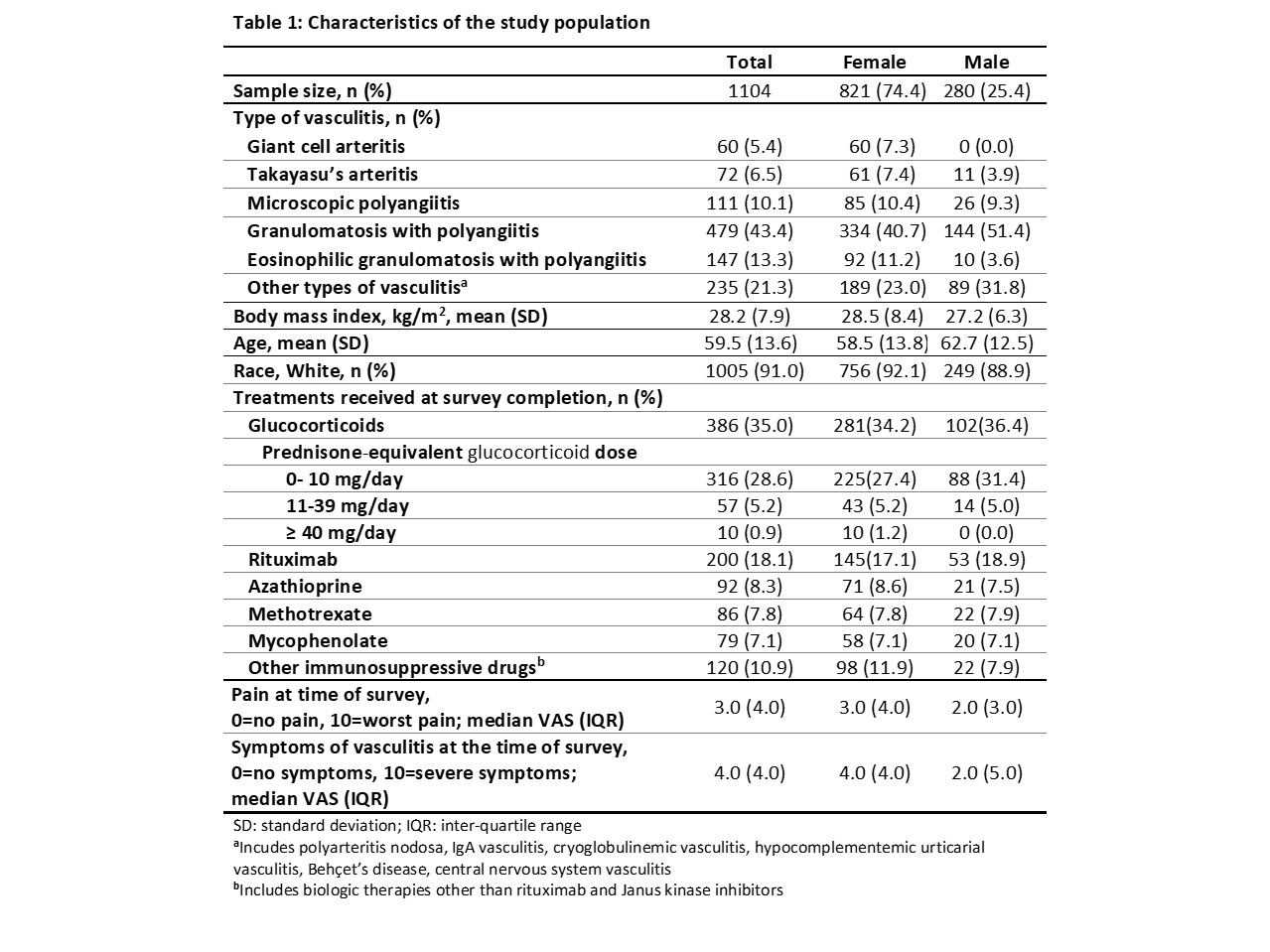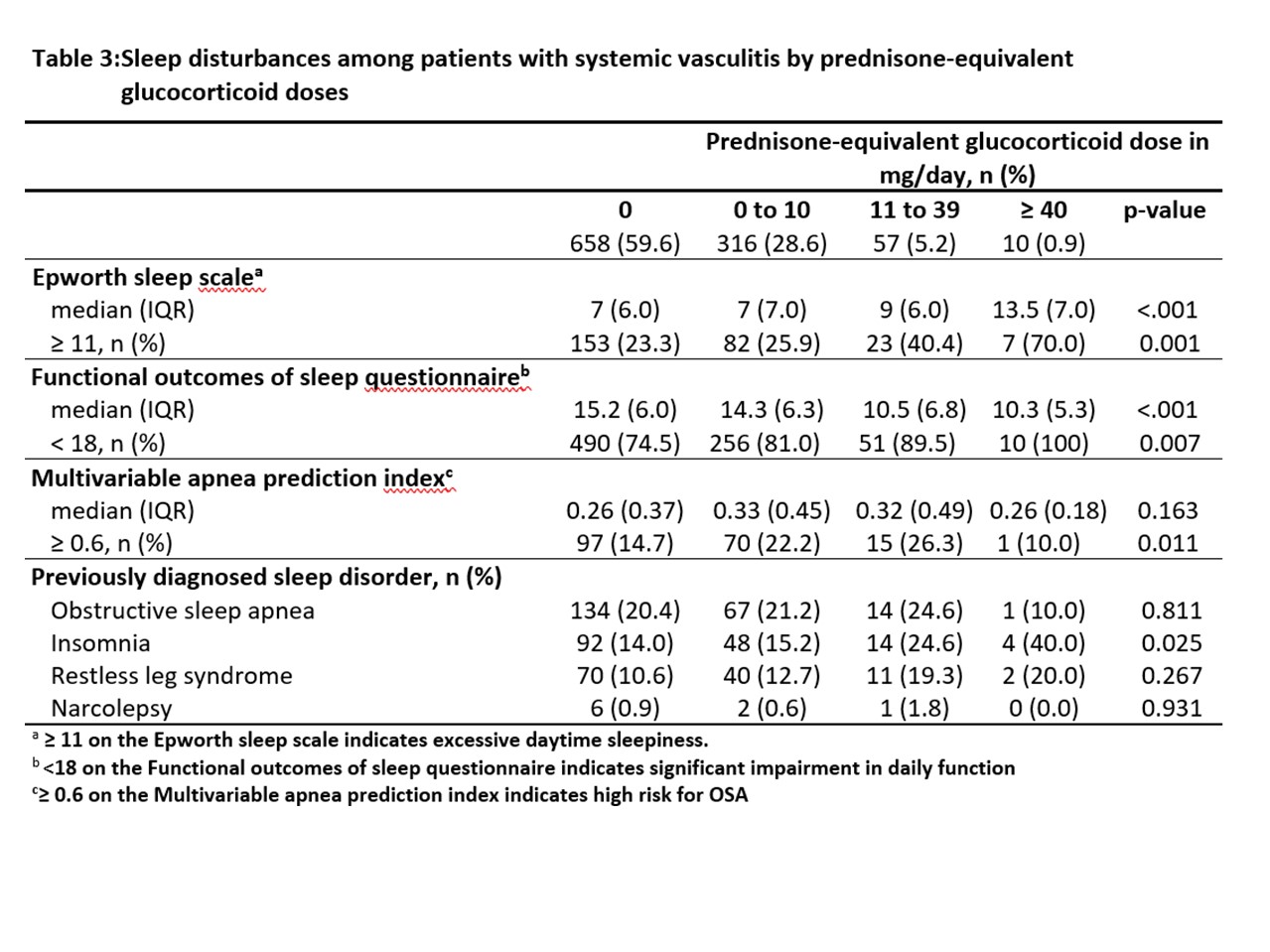Session Information
Date: Sunday, November 12, 2023
Title: (0691–0721) Vasculitis – Non-ANCA-Associated & Related Disorders Poster I
Session Type: Poster Session A
Session Time: 9:00AM-11:00AM
Background/Purpose: Sleep deprivation and sleep disorders can impair health-related quality of life and increase the risk of chronic diseases, such as cardiovascular disease, and mental illness. In patients with vasculitis, several factors could contribute to a higher risk of disordered sleep, including glucocorticoid use and upper airway involvement. This study aimed to describe sleep disturbances in patients with vasculitis.
Methods: In this cross-sectional study, we conducted an online survey of patients registered with the Vasculitis Patient-Powered Research Network (VPPRN). The questionnaire included these validated measures: Epworth Sleepiness Scale (ESS, range 0-24, < 10 normal), Functional Outcomes of Sleep Questionnaire-10 (FOSQ-10, range 5-20, higher scores indicate better function), and the Multivariable Apnea Prediction Index (MVAP, range 0-1, 1 indicates highest risk for obstructive sleep apnea (OSA)). Patients were also asked about previously diagnosed sleep disorders, characteristics of their vasculitis, medication use, and demographics. Responses were collected from February 1 to April 1, 2023.
Results: Of the 1,104 patients with vasculitis recruited, 1,037 completed the questionnaire in full. Participants included 479 with granulomatosis with polyangiitis, 147 with eosinophilic granulomatosis with polyangiitis, 111 with microscopic polyangiitis, 60 with Takayasu arteritis, 72 with giant cell arteritis, and 235 with other types of vasculitis. The study population was 74.4% female. The mean (SD) age and disease duration were 59.5 (13.6) and 9.7 (8.4) years, respectively. Use of glucocorticoids and immunosuppressants were common at the time of the survey (Table 1). At least 1 sleep disturbance was reported by 82% of patients with vasculitis. Excessive daytime sleepiness occurred in 26%, impaired daily function in 77%, and 19% were at high risk for obstructive sleep apnea (OSA). Previously diagnosed OSA, insomnia, and restless legs syndrome were reported by 20%, 14%, and 11% of patients, respectively (Table 2). Prevalence of OSA among this sample was higher than what is reported for the general population (6-17%). Similar to the general population, the risk of OSA was higher in males. Other sleep disorders, excessive daytime sleepiness, and daily functional impairment were more common in females (Table 2). Sleep disturbances were more prevalent in those taking higher doses of glucocorticoids (Table 3).
Conclusion: Sleep disturbances are common in patients with vasculitis and significantly impact daily function. Use and dose of glucocorticoids may increase the risk of sleep disturbances in patients with vasculitis.
To cite this abstract in AMA style:
Tanaka M, Stranges S, Speechley K, Espin Garcia O, Mason M, Borchin R, Burroughs C, Yeung C, Gurubhagavatula I, Pagnoux C, Merkel P, Barra L. Sleep Disturbances in Patients with Vasculitis: Results of the Vasculitis Patient-Powered Research Network Sleep Study (SleepVasc) [abstract]. Arthritis Rheumatol. 2023; 75 (suppl 9). https://acrabstracts.org/abstract/sleep-disturbances-in-patients-with-vasculitis-results-of-the-vasculitis-patient-powered-research-network-sleep-study-sleepvasc/. Accessed .« Back to ACR Convergence 2023
ACR Meeting Abstracts - https://acrabstracts.org/abstract/sleep-disturbances-in-patients-with-vasculitis-results-of-the-vasculitis-patient-powered-research-network-sleep-study-sleepvasc/



